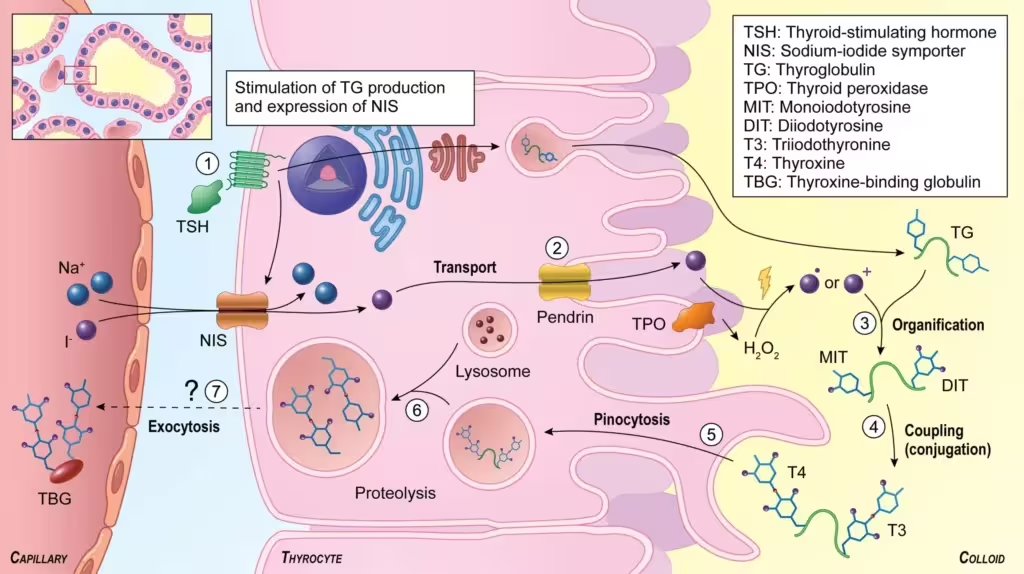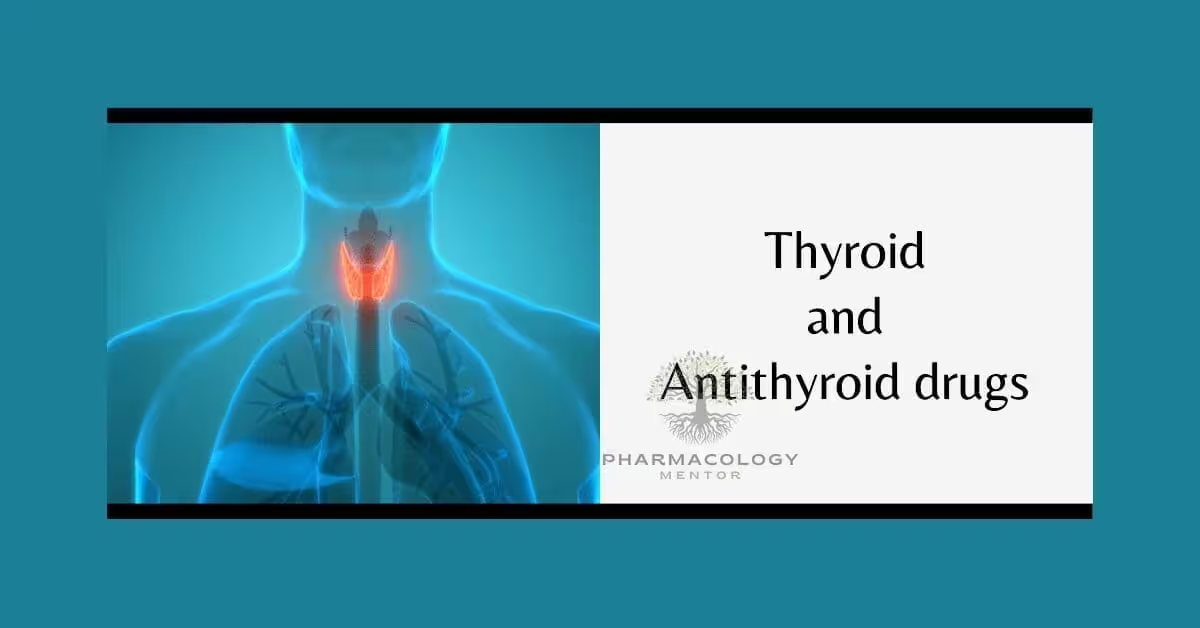Physiology of Thyroid Hormones
- Thyroid gland secretes T4 (thyroxine) and T3 (triiodothyronine); T3 is more potent, T4 is a prohormone converted peripherally to T3.
- Regulation: Hypothalamic-pituitary-thyroid axis (TRH → TSH → thyroid hormone secretion).
- Function: Regulate basal metabolic rate, growth, CNS development, cardiovascular, and metabolic functions.
Thyroid Hormone Synthesis

The thyroid secretes T4 and T3, the synthesis of which depends on dietary iodine or iodide supplements.
– Iodide ion is actively taken up by the thyroid, where it is converted to elemental iodine by thyroidal peroxidase.
– The protein thyroglobulin acts as a scaffold for thyroid hormone synthesis, with the iodination of tyrosine residues forming monoiodotyrosine (MIT) or diiodotyrosine (DIT), leading to the formation of T4 and T3.
– After synthesis, T4 and T3 are released into the blood and transported by thyroxine-binding globulin (TBG).
Thyroid Function Control
– Thyroid function is regulated by the pituitary gland through the release of thyrotropin (TSH), which stimulates iodide uptake, thyroid hormone synthesis, and release.
– High levels of thyroid hormones inhibit TSH release, providing negative feedback control.
– In Graves’ disease, an autoimmune disorder, antibodies can interfere with this regulation.
Thyroid Disorders
– Thyroid disorders are broadly categorized into hypothyroidism (decreased thyroid hormones) and hyperthyroidism (increased thyroid hormones).
– Hypothyroidism is treated with thyroid hormone replacement therapy using synthetic forms of T4 (levothyroxine) and T3 (liothyronine), which mimic the actions of thyroid hormones.
– Common side effects of thyroid hormone replacement therapy include headaches, insomnia, nervousness, weight loss, excessive sweating, heat intolerance, and cardiovascular effects like tachycardia and palpitations.
Thyroid Hormones: Pharmacology
| Feature | T4 (Levothyroxine) | T3 (Liothyronine) |
|---|---|---|
| Potency | Lower (~1/4 as potent as T3) | Higher potency |
| Half-life | ~7 days | ~24 hours |
| Onset | Slow (days) | Rapid (hours–days) |
| Route | Oral, IV | Oral, IV |
| Main use | Hypothyroidism, TSH suppression (thyroid cancer) | Severe hypothyroid states (myxedema coma), rapid correction, diagnostic tests |
| Pharmaceutics | Tablets, IV solution | Tablets, IV |
| Safety | Overdose: hyperthyroidism sx | Risk of arrhythmia/angina |
- Absorption: Empty stomach; food, calcium, iron can reduce absorption.
- PK: Plasma protein binding >99%. Metabolized in liver, excreted in bile.
Clinical Indications and Dosing
Levothyroxine:
- Dose individualized (typical: 1.6 mcg/kg/day)
- Start low in elderly/CV disease
- Monitor TSH (target: low-normal); T4 for central hypothyroidism
Liothyronine: - Faster acting; rarely used as monotherapy
- Used short-term or diagnostically.
Adverse Effects of Excess Replacement
- Signs of hyperthyroidism: anxiety, insomnia, palpitations, tachyarrhythmia, weight loss, osteoporosis (long term)
Antithyroid Drugs (Thionamides)
1. Thionamides
| Drug | Mechanism | Indications | Dose | Key Features |
|---|---|---|---|---|
| Propylthiouracil (PTU) | Inhibits thyroid peroxidase, blocks organification and coupling; ALSO blocks peripheral T4→T3 conversion | Graves’ disease, thyroid storm | 50–150 mg TID | Preferred in 1st trimester pregnancy and thyroid storm; hepatotoxic |
| Methimazole | Same as PTU (except minimal effect on T4→T3) | Graves’ disease | 5–40 mg QD | Longer acting, more potent; 2nd/3rd trimester choice; teratogenic in 1st trimester |
- Adverse effects: Rash, agranulocytosis (rare), hepatotoxicity, arthralgia, lupus-like syndrome, cholestasis (methimazole), vasculitis (PTU).
2. Iodides (Lugol’s iodine, potassium iodide)
- Inhibit thyroid hormone release (Wolff–Chaikoff effect), decrease gland vascularity.
- Rapid effect (days), used in thyroid storm, pre-op prep.
- S/E: Rash, salivary/gland swelling, metallic taste, rarely angioedema.
3. Radioactive Iodine (RAI-131)
- Destroys thyroid tissue (cytotoxic to follicular cells).
- Used for definitive therapy in hyperthyroidism—Graves’, toxic nodule, thyroid cancer.
- Contraindicated in pregnancy, pregnancy must be excluded prior.
4. Beta-blockers (e.g., propranolol)
- Symptom control: tachycardia, tremor, anxiety in thyrotoxicosis.
- High doses inhibit T4→T3 conversion.
Drugs Affecting Thyroid Function
- Amiodarone: Causes hypo- or hyperthyroidism—contains iodine, inhibits deiodinase.
- Lithium: Inhibits thyroid hormone release; may cause hypothyroidism.
- Glucocorticoids, contrast media: Inhibit T4→T3 conversion.
Summary Table
| Drug/Class | Mechanism | Main Use | Special Points |
|---|---|---|---|
| Levothyroxine | T4 hormone replacement | Hypothyroidism | Long half-life, steady effect |
| PTU, methimazole | Block TPO +/- T4→T3 | Hyperthyroidism | PTU in 1st trimester/thyroid storm, agranulocytosis/HEPATOXIC |
| Iodide | Block release/hormone synth | Thyroid storm, prep | Rapid, not for long-term |
| RAI-131 | Tissue ablation | Graves’, cancer | Not in pregnancy |
| Beta-blocker | Blocks T4→T3 (high dose), sx control | Storm, peri-RAI | Not definitive therapy |
References
- Goodman & Gilman’s The Pharmacological Basis of Therapeutics. 14th ed. 2022.
- StatPearls. Thyroid Medications. 2024.
- Katzung BG, Vanderah TW, Basic & Clinical Pharmacology. 16th ed. 2021.
For details on thyroid and antithyroid drugs, visit this page:
Medical Disclaimer
The medical information on this post is for general educational purposes only and is provided by Pharmacology Mentor. While we strive to keep content current and accurate, Pharmacology Mentor makes no representations or warranties, express or implied, regarding the completeness, accuracy, reliability, suitability, or availability of the post, the website, or any information, products, services, or related graphics for any purpose. This content is not a substitute for professional medical advice, diagnosis, or treatment; always seek the advice of your physician or other qualified health provider with any questions you may have regarding a medical condition and never disregard or delay seeking professional advice because of something you have read here. Reliance on any information provided is solely at your own risk.

